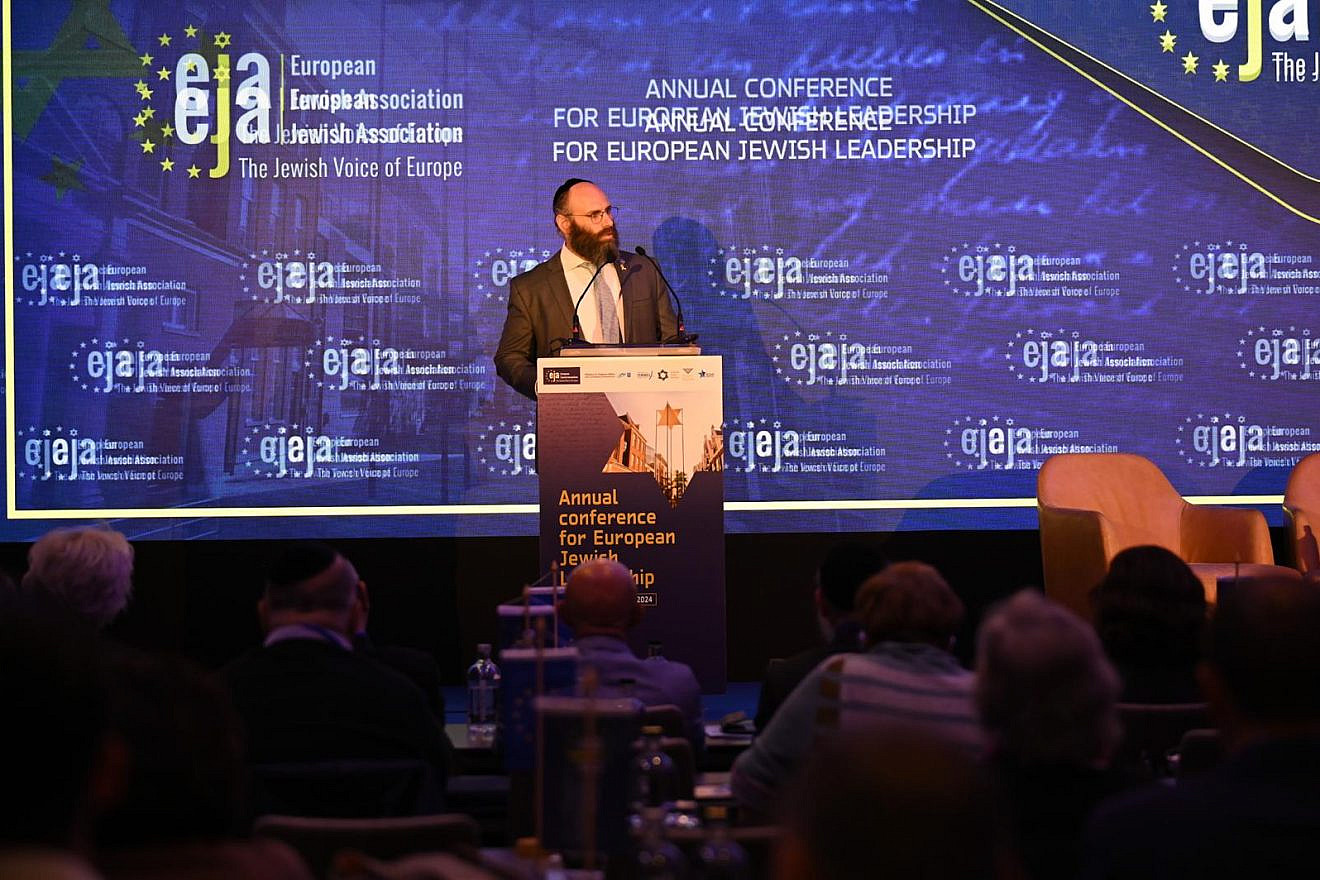As hundreds of Jews descended on Amsterdam for an “emergency summit,” the head of the European Jewish Association on Monday called on Israel to prepare for a mass influx of immigrants as antisemitism skyrockets across the continent.
Rabbi Menachem Margolin, who had previously criticized Prime Minister Benjamin Netanyahu for encouraging European Jewry to make aliyah, has, given the current situation, changed tack.
“Prime Minister Netanyahu, we are not there yet but be ready. Get your government agencies ready. Because if European governments carry on as they have so far, if they continue to tolerate this flood of Jew-hatred, they can expect hundreds and thousands of us to leave,” Margolin said in his address to open the summit.
“We meet in Amsterdam to fight back for our home. But it can only continue to be our home if governments in Europe want us to stay and help us in our fight. Today, we met to give them the tools to do so,” he continued.
“Europe is our home, and whilst Israel is our insurance policy, we will not call it in until absolutely necessary,” added Margolin.
The EJA summit is taking place on Monday and Tuesday in the Dutch metropolis on the backdrop of widespread antisemitism that has reached concerning heights amid Israel’s ongoing war against Hamas in Gaza.
“Every logical person, every person who looks after his family and children wants to live in security, and if this very basic condition does not exist, people will look to find an alternative. So the answer is yes, I fear for the future of European Jewry,” Margolin told JNS in Amsterdam on Monday.
Israeli Foreign Minister Israel Katz expressed his support in a pre-recorded video message.
“Since Hamas’s October 7 massacre, antisemitism reared its ugly head everywhere in the world, and as the Jewish state we cannot accept the reality that in 2024, Jews are forced to hide their Jewish identity from fear of being hurt,” Katz said.
“It is our responsibility to fight antisemitism and antisemites themselves. We all understand that there is a direct connection between the situation in Israel and the attitude towards the Jewish communities in the world. As such it is our mission to strengthen one another,” he continued.
“You are our brothers and our family. I wish you success and extend my hand in partnership. The people of Israel lives,” Katz said.
The conference is being organized in collaboration with the Israeli Ministry of Diaspora Affairs and Combating Antisemitism, the Centraal Joods Overleg (the umbrella group of Dutch Jewry), the Jewish communities of Hungary, Paris and Porto, Portugal, the Federation of Synagogues (U.K.), Christians for Israel and others.

The European Commission
Also attending the EJA emergency summit was Katharina von Schnurbein, European Commission coordinator on combating antisemitism and fostering Jewish life.
“The European Commission has adopted a strategy in 2021 which is very clear that we want Jews in Europe to go about in line with their cultural and religious traditions and free from security concerns,” von Schnurbein told JNS.
“We have the ambition to say we want a European Union free from antisemitism. We know we are far from it at the moment, but the European Commission is very much on the side of the Jewish communities in fighting their battle with them and in being very clear that it is not for the Jews to fight antisemitism, it is for all of us, the society at large and governments to address these issues,” she said.
One panel discussion on Monday focused on policies and solutions to strengthen European governments’ response to antisemitism, and was moderated by EJA senior adviser Ruth Wasserman Lande, a former Israeli lawmaker.
“There is a sense among European Jews of feeling alone despite steps taken by authorities. There needs to be a lot more advocacy, lobbying work and reporting of crimes against Jewish people. So much that needs to be done, some of it is being done by the EJA,” Wasserman Lande told JNS.
“We must unite in order to be able to deal with this challenge, which is very significant. I appreciate the privilege and the opportunity to come and meet with leaders of Jewish communities throughout Europe and bring in operative solutions and best practices so that Jewish peoplehood can improve,” she said.
Wasserman Lande cited a EJA forum that took place on May 22, in which the organization brought in legal experts to discuss existing and potential legislation in European countries to counter Jew-hatred.
“We focused on how to explain to law enforcement agencies current laws and how they can be applied to actually combat antisemitism, as opposed to having laws on the books that agencies don’t know how to enforce,” Wasserman Lande said.
Based in Brussels, the EJA works to strengthen Jewish identity, expand Jewish activities in Europe and defend Jewish interests, including by creating political initiatives against the BDS movement and by representing Jews in European conversations affecting minorities.
“We felt we needed to do something to be as effective as we can and try to come up with solutions that we will go and propose to governments, law enforcement authorities, politicians and educators,” Tal Rabina, EJA director of strategy and head of EJA’s Israel office, told JNS.
“The situation is becoming as dangerous as it was in the Holocaust days, there are so many similarities,” he continued. “When I say we, I mean not just the Jews but also European societies. The extremism, the hate speech, writing antisemitic messages on walls, this is how it all began. One should remember that the Nazi regime started in ‘liberal’ universities.”
Rabina explained that Jewish communities in Europe were not seeking decision-makers’ sympathy but rather action.
“Some leaders are following populist trends instead of leading and this is a catastrophe,” he said. “Blaming Israel and the Jewish people, which you don’t do in any other conflict in the world is terrible and effectively increases antisemitism. We must fight back.”
On Tuesday, conference participants will visit Amsterdam’s Portuguese Synagogue, the National Holocaust Museum and the Hollandsche Schouwburg (English: “Hollandic Theater”) museum, which was used as a deportation center during the Holocaust.
They will also tour the Anne Frank House, a museum dedicated to the young diarist who hid in Amsterdam with her family and eventually perished in the Holocaust.
“It is our priority to make sure that Jews can live their culture and their identity in the freest way because that is the core value that we built our European society on,” Eddo Verdoner, national coordinator on combating antisemitism in the Netherlands, told JNS.
“The government is working on a plan to make sure that students receive in-class education but also give them incentives to go out of the class and visit Holocaust memorial centers. This is one of the most effective tools against disinformation and conspiracy theories,” he said.
“Some Jews have said that they left the Netherlands because of antisemitism, and this is very regrettable. If people want to move to Israel, that’s their right, but it must be done out of choice. It must never be done out of fear. When that happens, we fail as a state and we fail as a European Union,” said Verdoner.


























